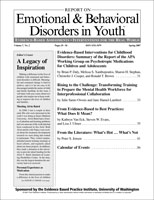Can Federal Investments in Child Serving Systems Improve Caregiver Service Experience? Results of a Comparison Study
Author: Kara S. Riehman, Ph.D..; Ana Maria Brannan, Ph.D..; Robert L. Stephens, Ph.D..; Brigitte A. Manteuffel, Ph.D..
Source: Volume 11, Number 01, Winter 2011 , pp.12-18(7)

< previous article |next article > |return to table of contents
Abstract:
Over the past two decades, reform of child mental health service delivery has expanded rapidly as communities strive to develop well-coordinated, community-based systems of care (SOCs) for children and their families. A primary mechanism for dissemination of the SOC approach has been the Children’s Mental Health Initiative (CMHI), which provides federal funds through the Center for Mental Health Services of the Substance Abuse and Mental Health Services Administration (SAMHSA) to develop SOCs across the country. Systems that receive these funds have used them to improve services by, for example, increasing service capacity, expanding the service array, improving service delivery models (e.g., implementing the wraparound practice model), implementing evidence-based practices, developing more culturally competent services, supporting family involvement in system development, and maximizing interagency collaboration. At the system level, previous research efforts have tried to assess whether CMHI funds are, indeed, promoting systems that function in keeping with the above principles. This research relies on having trained site visitors spend several days within communities to review documents and administer semistructured interviews with multiple stakeholders. Based on the data collected, site visitors then rate the site on multiple indicators. Findings from early comparison studies of federally funded programs implementing the reform model suggest that funded systems receive higher scores than the matched communities providing traditional mental health services but that practices were also emerging in nonfunded communities that mirrored the changes in funded systems toward more individualized, family-focused, coordinated, and culturally competent service delivery.Keywords: Comprehensive Community Mental Health Services for Children and their Families Program
Affiliations:
1: ICF Macro; 2: Vanderbilt Peabody College Center for Evaluation and Program Improvement; 3: ICF Macro; 4: ICF Macro.